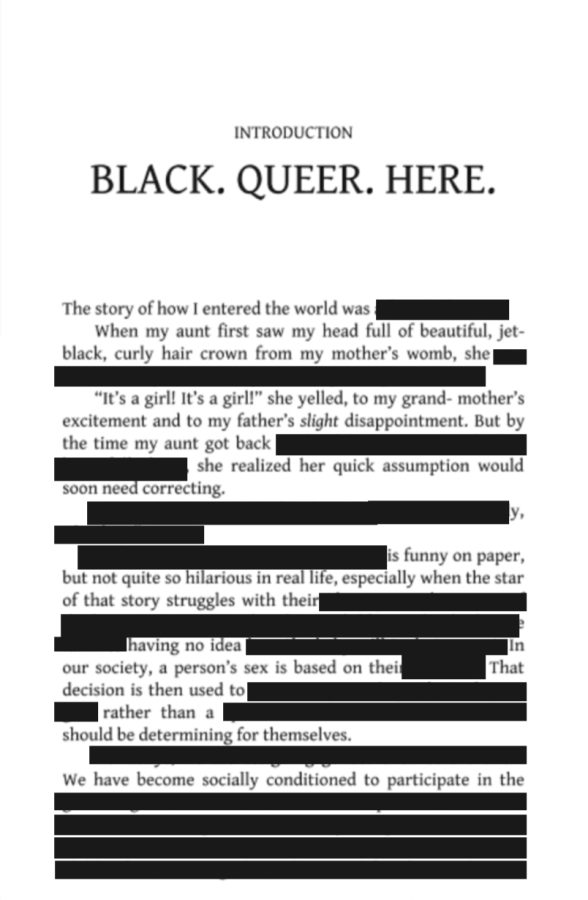The rise of book-banning in schools
Several books, including “All Boys Aren’t Blue,” are being reviewed across the U.S. to determine whether they should be taken from school library shelves.
May 1, 2022
“1984,” “Of Mice and Men,” “Uncle Tom’s Cabin,” “To Kill a Mockingbird.” These and several other classics are among some of the most challenged books in American history.
Now, this list includes modern best-sellers like “The Hate U Give,” “Lawn Boy,” “Gender Queer,” and “All Boys Aren’t Blue.” All of these titles tackle topics of racism, sexuality, gender, and abuse.
There has been a rise in book censorship across the country, from controversial novels like “Catcher in the Rye” that was criticized for its graphic nature, to graphic novels like “Captain Underpants,” which was banned in several schools for “anti-family content”.
The American Library Association in 2021 reported a stark increase in book challenges, recording 729 censorship attempts — the most since 2000.
The association in a November statement defended every reader’s ability to “read and access information freely.”
“We stand opposed to censorship and any effort to coerce belief, suppress opinion, or punish those whose expression does not conform to what is deemed to be orthodox in history, politics, or belief,” the association said in said last November,” the association said.
Mary Cosby, Stephen Decatur High School’s librarian, weighed in on the cause of the uptick in book banning.
“Book challenges follow what society has not come to terms with,” she said. “People are more divided than ever due to politics, so book banning just gives one more avenue.”
As America’s social and political climate continues to undergo constant change, so does its media. From “The Jungle,” which exposed the unlawful practices of the meat-packing industry, to “Uncle Tom’s Cabin,” which criticized slavery and fueled the abolitionist movement in the 1800s, literature has always reflected the world it is written in.
Similarly, today’s banned books are a reflection of real life stories. This rings true for the controversial “All Boys Aren’t Blue,” a 2020 memoir by George M. Johnson that details their life as a queer Black person growing up in America.
Complaints arose about the novel’s explicit content, which addresses sex, abuse, and statutory rape, as well as racism and sexuality. Several schools in ten states have banned the book, including here the Eastern Shore in Wicomico and Somerset counties, where the book has been removed from shelves.
Here in Worcester County, parents expressed their concerns with the Board of Education at a meeting in March. Some parents advocated for it to remain, while others requested its removal.
One parent read an explicit excerpt to the audience – before revealing it to actually be a passage from the Bible. She then discussed how censorship attempts often take books out of context in order to label them as inappropriate.
Another parent clarified that censoring “All Boys Aren’t Blue” is to protect student mental health and maintain a safe environment.
A committee made the decision to keep the book in Worcester school libraries.
Cosby noted how “book challengers usually don’t read the entire book to find out the message the book is conveying but take passages out of context to form their opinion,” she said. “A book needs to be read in its entirety in order to understand the book’s overall message. Some students will use the book as a mirror and others will see it as a window to build understanding.”
Most concerns about the book cited age appropriateness, but here at Decatur, library books must meet certain criteria in order to be allowed. Every book that the librarians choose must have two positive reviews and be within grade range. Their supervisor then approves them before they hit the shelves.
Students can choose from a variety of genres, including those that may challenge what is typically written about in mainstream media. Despite attempts to censor these books, they often increase their sales.
One example of this is “And Tango Makes Three,” a picture book about two male penguins raising a penguin chick together. It was listed among the American Library Association’s Most Banned Books of 2012. Amazon sales showed a large increase in sales after it was banned for homosexuality and being age inappropriate.
Although controversial books are being challenged in several schools, some are holding Banned Book Weeks to combat this and promote the freedom to read.
“Each student has a right to choose what they feel comfortable reading,” Cosby said.


